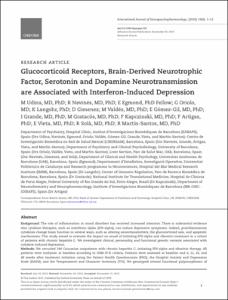Mostra el registre d'ítem simple
Glucocorticoid receptors, brain-derived neurotrophic factor, serotonin and dopamine neurotransmission are associated with interferon-induced depression
| dc.contributor.author | Udina, Marc |
| dc.contributor.author | Navinés, Ricard |
| dc.contributor.author | Egmond, E. |
| dc.contributor.author | Oriolo, G. |
| dc.contributor.author | Langohr, Klaus |
| dc.contributor.author | Giménez, Dolors |
| dc.contributor.author | Valdés, M. |
| dc.contributor.author | Gomez Gil, E. |
| dc.contributor.author | Grande, I. |
| dc.contributor.author | Gratacos, M. |
| dc.contributor.author | Kapczinski, F. |
| dc.contributor.author | Artigas, F. |
| dc.contributor.author | Vieta, E. |
| dc.contributor.author | Sola, R. |
| dc.contributor.author | Martin Santos, R. |
| dc.contributor.other | Universitat Politècnica de Catalunya. Departament d'Estadística i Investigació Operativa |
| dc.date.accessioned | 2017-02-08T09:16:23Z |
| dc.date.available | 2017-02-08T09:16:23Z |
| dc.date.issued | 2016-12-30 |
| dc.identifier.citation | Udina, M., Navines, R., Egmond, E., Oriolo, G., Langohr, K., Giménez, D., Valdés, M., Gomez, E., Grande, I., Gratacos, M., Kapczinski, F., Artigas, F., Vieta, E., Sola, R., Martin, R. Glucocorticoid receptors, brain-derived neurotrophic factor, serotonin and dopamine neurotransmission are associated with interferon-induced depression. "International journal of neuropsychopharmacology", 30 Desembre 2016, vol. 19, núm. 4, p. 1-12. |
| dc.identifier.issn | 1461-1457 |
| dc.identifier.uri | http://hdl.handle.net/2117/100658 |
| dc.description.abstract | Background: The role of inflammation in mood disorders has received increased attention. There is substantial evidence that cytokine therapies, such as interferon alpha (IFN-alpha), can induce depressive symptoms. Indeed, proinflammatory cytokines change brain function in several ways, such as altering neurotransmitters, the glucocorticoid axis, and apoptotic mechanisms. This study aimed to evaluate the impact on mood of initiating IFN-alpha and ribavirin treatment in a cohort of patients with chronic hepatitis C. We investigated clinical, personality, and functional genetic variants associated with cytokine-induced depression.; Methods: We recruited 344 Caucasian outpatients with chronic hepatitis C, initiating IFN-alpha and ribavirin therapy. All patients were euthymic at baseline according to DSM-IV-R criteria. Patients were assessed at baseline and 4, 12, 24, and 48 weeks after treatment initiation using the Patient Health Questionnaire (PHQ), the Hospital Anxiety and Depression Scale ( HADS), and the Temperament and Character Inventory (TCI). We genotyped several functional polymorphisms of interleukin-28 (IL28B), indoleamine 2,3-dioxygenase (IDO-1), serotonin receptor-1A (HTR1A), catechol-O-methyl transferase (COMT), glucocorticoid receptors (GCR1 and GCR2), brain-derived neurotrophic factor (BDNF), and FK506 binding protein 5 (FKBP5) genes. A survival analysis was performed, and the Cox proportional hazards model was used for the multivariate analysis.; Results: The cumulative incidence of depression was 0.35 at week 24 and 0.46 at week 48. The genotypic distributions were in Hardy-Weinberg equilibrium. Older age (p = 0.018, hazard ratio [HR] per 5 years = 1.21), presence of depression history (p = 0.0001, HR = 2.38), and subthreshold depressive symptoms at baseline (p = 0.005, HR = 1.13) increased the risk of IFN-induced depression. So too did TCI personality traits, with high scores on fatigability (p = 0.0037, HR = 1.17), impulsiveness (p = 0.0200 HR = 1.14), disorderliness (p = 0.0339, HR = 1.11), and low scores on extravagance (p = 0.0040, HR = 0.85). An interaction between HTR1A and COMT genes was found. Patients carrying the G allele of HTR1A plus the Met substitution of the COMT polymorphism had a greater risk for depression during antiviral treatment (HR = 3.83) than patients with the CC (HTR1A) and Met allele (COMT) genotypes. Patients carrying the HTR1A CC genotype and the COMT Val/Val genotype (HR = 3.25) had a higher risk of depression than patients with the G allele (HTR1A) and the Val/Val genotype. Moreover, functional variants of the GCR1 (GG genotype: p = 0.0436, HR = 1.88) and BDNF genes (Val/Val genotype: p = 0.0453, HR = 0.55) were associated with depression.; Conclusions: The results of the study support the theory that IFN-induced depression is associated with a complex pathophysiological background, including serotonergic and dopaminergic neurotransmission as well as glucocorticoid and neurotrophic factors. These findings may help to improve the management of patients on antiviral treatment and broaden our understanding of the pathogenesis of mood disorders. |
| dc.format.extent | 12 p. |
| dc.language.iso | eng |
| dc.rights.uri | http://creativecommons.org/licenses/by-nc-nd/3.0/es/ |
| dc.subject | Àrees temàtiques de la UPC::Matemàtiques i estadística::Probabilitat |
| dc.subject.lcsh | Combinatorial probabilities |
| dc.subject.other | 5HT1A |
| dc.subject.other | COMT |
| dc.subject.other | depression |
| dc.subject.other | GCR1 |
| dc.subject.other | genetic |
| dc.subject.other | hepatitis C |
| dc.subject.other | inflammation pathways |
| dc.subject.other | personality traits |
| dc.subject.other | risk factors |
| dc.title | Glucocorticoid receptors, brain-derived neurotrophic factor, serotonin and dopamine neurotransmission are associated with interferon-induced depression |
| dc.type | Article |
| dc.subject.lemac | Combinatòria |
| dc.contributor.group | Universitat Politècnica de Catalunya. GRBIO - Grup de Recerca en Bioestadística i Bioinformàtica |
| dc.identifier.doi | 10.1093/ijnp/pyv135 |
| dc.description.peerreviewed | Peer Reviewed |
| dc.subject.ams | Classificació AMS::60 Probability theory and stochastic processes::60C05 Combinatorial probability |
| dc.relation.publisherversion | http://ijnp.oxfordjournals.org/content/19/4/pyv135 |
| dc.rights.access | Open Access |
| local.identifier.drac | 18732594 |
| dc.description.version | Postprint (published version) |
| local.citation.author | Udina, M.; Navines, R.; Egmond, E.; Oriolo, G.; Langohr, K.; Giménez, D.; Valdés, M.; Gomez, E.; Grande, I.; Gratacos, M.; Kapczinski, F.; Artigas, F.; Vieta, E.; Sola, R.; Martin, R. |
| local.citation.publicationName | International journal of neuropsychopharmacology |
| local.citation.volume | 19 |
| local.citation.number | 4 |
| local.citation.startingPage | 1 |
| local.citation.endingPage | 12 |
Fitxers d'aquest items
Aquest ítem apareix a les col·leccions següents
-
Articles de revista [214]
-
Articles de revista [719]


